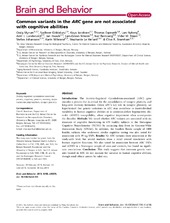Common variants in the ARC gene are not associated with cognitive abilities
Myrum, Craig; Giddaluru, Sudheer; Jacobsen, Kaya Kvarme; Espeseth, Thomas; Nyberg, Lars; Lundervold, Astri; Haavik, Jan; Nilsson, Lars-Göran; Reinvang, Ivar; Steen, Vidar Martin; Johansson, Stefan; Wibrand, Karin; Le Hellard, Stephanie; Bramham, Clive R.
Peer reviewed, Journal article
Published version

Åpne
Permanent lenke
https://hdl.handle.net/1956/10930Utgivelsesdato
2015-09-03Metadata
Vis full innførselSamlinger
Originalversjon
https://doi.org/10.1002/brb3.376Sammendrag
Introduction: The Activity-Regulated Cytoskeleton-associated (ARC) gene encodes a protein that is critical for the consolidation of synaptic plasticity and long-term memory formation. Given ARC's key role in synaptic plasticity, we hypothesized that genetic variations in ARC may contribute to interindividual variability in human cognitive abilities or to attention-deficit hyperactivity disorder (ADHD) susceptibility, where cognitive impairment often accompanies the disorder. Methods: We tested whether ARC variants are associated with six measures of cognitive functioning in 670 healthy subjects in the Norwegian Cognitive NeuroGenetics (NCNG) by extracting data from its Genome-Wide Association Study (GWAS). In addition, the Swedish Betula sample of 1800 healthy subjects who underwent similar cognitive testing was also tested for association with 19 tag SNPs. Results: No ARC variants show association at the study-wide level, but several markers show a trend toward association with human cognitive functions. We also tested for association between ARC SNPs and ADHD in a Norwegian sample of cases and controls, but found no significant associations. Conclusion: This study suggests that common genetic variants located in ARC do not account for variance in human cognitive abilities, though small effects cannot be ruled out.
